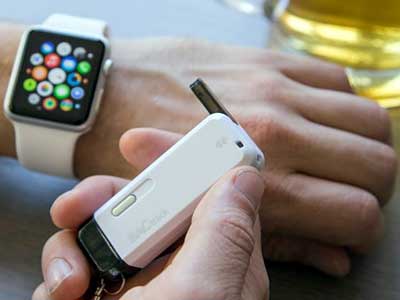“We are just beginning to understand how to use communication technology to help individuals reduce their drinking and related consequences,” said Brian P. Suffoletto, assistant professor of emergency medicine at the University of Pittsburgh. “Our group previously found that text messaging near typical drinking occasions could reduce hazardous drinking by young adults. However, we wanted to interact with individuals when drinking decisions were actually being made. We could either frequently query individuals about their drinking-related activities, which would quickly become annoying, or sense when an individual is drinking, and interact with them only when pertinent.”
Suffoletto explained that current smartphones incorporate multi-modal sensors that are able to collect meta-data that help infer when drinking occasions are either occurring or going to occur. “For example, individuals may exhibit impaired psychomotor function due to alcohol, which results in more typing misspellings, which can be sensed by phones,” he said. Suffoletto will discuss these findings at the RSA meeting on June 28.
The researchers recruited 38 young adults with past hazardous drinking habits, and collected continuous phone-sensor data and daily reports of drinking from them for 28 consecutive days. They recorded 45 binge-drinking, 41 non-binge drinking, and 207 non-drinking episodes. Machine learning models using time-based features (i.e. time of day, day of week), motion-based features (number of activities, accelerations, rotations), device-usage features (screen interactions, screen unlocks, typing deletions/insertions), and communication-based features (outgoing calls, missed calls, correspondents) to predict binge drinking with 94 percent accuracy. “To our knowledge, this is the first time that phone sensors have been used to predict drinking occasions,” he said.
“We found that continuous phone-sensor data can be reliably collected from individuals,” said Suffoletto. “This sensor data can be useful in inferring activities associated with drinking occasions. However, the ability to predict drinking occasions before they actually occur, and the effectiveness of individualized digital interventions that use real-time sensor data to trigger intervention delivery, have yet to be determined.”
Suffoletto is aware of ‘Big Brother’ concerns. “Although current technological innovations offer unprecedented opportunities to advance the science of alcohol treatment and prevention,” he admitted, “they also push the boundaries of data privacy. Our work should prompt scientists to discuss and debate this balance.”

















Related Items
Brain Activity Data can predict what will be popular with consumers
Drinking water to millions of pilgrims through 233 Water ATMs in Kumbh
AI decreases human-generated content, limiting data for training AI